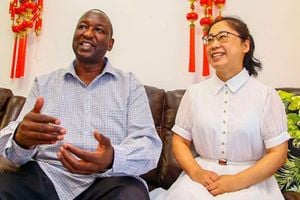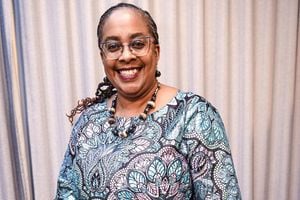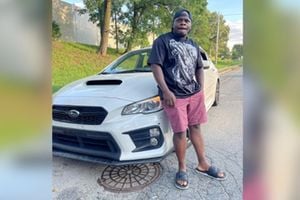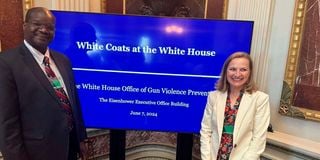
Dr Isaac Opole (left) with Dr Coleen Christmas, the Governor of the Maryland Chapter, ACP, at the White.
In Kansas City, Kansas
Kenyan doctors are making tremendous contributions around the globe. Frustrated by conditions at home, they have become leading specialists in countries such as the United States, Canada, South Africa, Botswana, Swaziland, and the United Kingdom.
One of the shining stars is Dr Isaac Opole, a Kenyan from Nyakach in Kisumu County who was raised in Kabete, Kikuyu County. He serves as the President of the American College of Physicians (ACP), a prestigious organisation of more than 161,000 medical practitioners worldwide. The ACP is the largest professional body for medical specialties and the second-largest physician membership society in the US.
At the University of Kansas Medical Center, where Dr Opole, 59, works as an internal medicine physician, his colleagues seek his guidance and support, and his patients trust him with their lives. Internal medicine involves specialists who use scientific knowledge, clinical expertise, and compassion to provide preventive, diagnostic, and therapeutic care for adults, ranging from healthy individuals to those with complex illnesses.
After graduating from the University of Nairobi with a Bachelor of Medicine and Bachelor of Surgery in 1992, the ambitious young doctor felt frustrated by the limited resources and opportunities available to him in Kenya. He observed many of his colleagues leaving the country in search of better pay, improved working conditions, and greater opportunities.
It seemed that the nation’s brightest and most talented individuals were emigrating to the West. So, when the opportunity arose, he seized it. He understood that this move would grant him access to cutting-edge technology, world-class mentorship, and a global network of peers.
As he left Nairobi, there was a sense of trepidation about the unknown journey ahead. He, however, took comfort in knowing he was part of a diaspora of Kenyan professionals scattered across the globe, striving to make a difference in their adopted countries.
The lack of funding for research, bureaucratic red-tape, limited career advancement opportunities, and political instability had taken a toll. In contrast, moving to the US presented him with a chance to collaborate with leading experts, access high-tech facilities, and engage in research that could have a meaningful impact on people’s lives.
Deplorable facilities
“I came to the US for about three months for research and then returned to Kenya to teach at KMTC and the University of Nairobi. Back then, as is the case now, there was considerable frustration and despair over the state of healthcare, the working environment, and ongoing strikes by young doctors. During the big strike of 1992, the government offered us nothing. The healthcare facilities were deplorable and rundown. Many of us started to look for options elsewhere. Various countries quickly recruited us, including South Africa, Botswana, and Swaziland, which opened recruitment offices at the International Life House to hire us,” he recalls.
“Many of my colleagues travelled to South Africa, Botswana, Swaziland, Europe, and Australia. Some of us, however, found our way here. I came to the US in 1996 for a research fellowship from the National Institutes of Health, which led me to pursue a PhD in neuroscience at the University of California, Irvine. Given the circumstances in Kenya at the time — clashes and other horrific events — I was hesitant about returning. Many Kenyans were being offered asylum in the US, so I thought, ‘Why would I return to Kenya when so many are fleeing?’ Ultimately, I decided to stay and pursue my medical career.
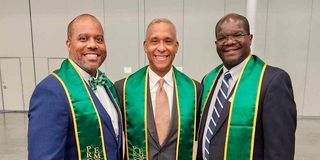
Dr Isaac Opole (right) with with former ACP presidents Dr Ryan Mire (left) and Dr Wayne Riley.
“As I finished my studies in California, my wife, Dr Rebecca Opole, was accepted into a residency training programme in internal medicine at the University of Kansas Medical Center. We have a great family story with Kansas because in the early ‘60s, my father, Richard Oduol-Opole, studied Animal Husbandry at Kansas State University. So, it seemed natural for me to join my wife here,” he says, and adds,
“How did some of us end up here? The Americans realised they needed many doctors and could not train and fund all the physicians they required. So, they established the Educational Commission for Foreign Medical Graduates to vet and bring in the best foreign-trained physicians. They effectively acquired doctors at no cost. In Kenya, however, we train these doctors but then allow them to leave the country or, tragically, let them die. After investing all our natural resources in their education and training, this is a problem we must address as a society,” he observes.
Traumatic situations
No wonder medical interns and residents flee Kenya, and some take their own lives due to overwhelming frustration.
Dr Opole notes: “It is heart-wrenching whenever someone feels they have no hope or future, which can lead them to take their own life. It is tragic for a young person just starting their life and career. I believe there are others who have contemplated it but have not gone through with it. Under the best circumstances, medical training is difficult; it depletes your energy. The nature of the work itself can be traumatic. Consider the most horrific road accident — the survivors come to us. In America, we deal with gunshot wound victims. We witness and manage numerous traumatic situations, caring for people at their lowest points. We face the emotional strain of our patients' pain while also working incredibly long hours. On top of that, you also have the personal problem of not having food and being unable to pay your rent.”
He continues, “You can see how suicide can happen in such an environment. There is a pervasive issue within the culture of medicine, especially concerning training, where hardship is expected and imposed. I experienced this as a trainee in Kenya, and again here in the US. I recall in Kenya having rotations where I left my house on a Monday with enough clothes to last for three days, knowing I wouldn’t return to my apartment for that long. Patients sometimes asked me, seeing me running up and down the hallway day and night, ‘Don’t you have a home?’ That was the expectation: to be in the hospital for 24 hours a day, sometimes for three or four consecutive days, with no expectation of sleep. This has been a long-standing norm. If you speak to older generations of medical professionals, they might say, ‘Oh, it has always been this way, or you are just weak.’ In a sense, this culture has been ingrained since formal medical training began. We have always been overworked, and while this has been accepted as normal, it needs to change.”
Medical insurance is expensive. According to the World Health Organisation, the practice of out-of-pocket payments places a substantial financial burden on over 200 million people in Africa, pushing more than 150 million of them into or further into poverty across the continent. Approximately half of all individuals impoverished due to out-of-pocket payments live in Africa, indicating a rising and concerning trend. Are there lessons that Africans could learn from the US system?
“The American system is broken. I sit on the board of directors of the Government Employees Health Association here in the US, which administers health insurance programmes for federal employees and retirees. Health insurance is a complex business because what you’re insuring is something that, for better or for worse, is becoming increasingly expensive. The expectation from the insured is to receive the services promised once they have insurance. However, insurance companies need to ensure that they are not paying out more than they receive in premiums. Thus, you find yourself in a situation where consumers expect to receive everything, while insurers are reluctant to provide comprehensive coverage because they need to maintain profitability. Many Americans travel to India, Malaysia, and other countries for medical tourism, and some go to Canada for prescription medications that are too costly here. No country has the perfect solution,” he notes.
Many Kenyans are confused about the Social Health Authority and the Social Health Insurance Fund (SHIF), which deduct money from their salaries yet fail to provide the necessary services. The nullification of the National Health Insurance Fund and the maddening transition period have contributed to their annoyance. “When I was growing up, we didn’t have insurance, but we could go to government hospitals and receive healthcare. My mother would take me on the bus, and we would all get treated. What has changed since then that has made it difficult for us to access healthcare through insurance? The costs have escalated to the point where even a simple prescription has become unaffordable. These are the issues we need to address. I don’t believe that implementing SHIF will guarantee healthcare for everyone. That is not the solution. A multi-pronged and multifaceted approach is necessary,” says Dr Opole.
Insurance plays a critical role in the fight against chronic illnesses. Many, for instance, die from cancer due to a lack of medical cover, making it a leading cause of death in Africa and a major public health issue.
Dr Opole weighs in.
“The only way to reduce cancer deaths is through early detection. Screening is crucial for the prevention, early treatment, and management of these conditions. In the US, breast cancer is no longer a death sentence for many women who undergo early screening, and prostate cancer is no longer a death sentence for men who are screened and treated early. Sadly, people often ignore the importance of screening, even among my friends and family members. They have a mentality of, ‘If I go, they might find something.’”
“We can develop a culture of screening similar to the robust culture of fitness in Kenya. People are running marathons, and Karura Forest is filled with individuals walking and jogging. We should foster the same passion for screening as we do for cardiovascular fitness and health,” he advises.
So, how did Dr Opole rise to the top of the ACP? “It’s a 20-year-long story,” he recalls.
“I joined as a trainee and medical resident in the early 2000s and started out like anyone else by attending conferences and presenting papers. Through my hard work, dedication, and enthusiasm, I gained recognition. I was soon appointed as the Assistant Dean of Student Affairs at the University of Kansas Medical Center. Before that, I was a lecturer at both the University of Nairobi and the Kenya Medical Training College.
“I started off as a member of the Council of the Kansas Chapter (of the ACP). In 2015, I was elected as the Governor and led the chapter for four years, through the middle of the pandemic. In 2020, I was elected to the board of regions of the ACP, where I served until last year. Although typical board members serve for two years, I served for four. In April, I was elected president of the ACP. Only four Black individuals have held this position since the organisation was founded in 1915 (January 8), and I am the first African ever to do so. This illustrates the complexities of America’s racial and structural context. Becky (Dr Rebecca Opole) seems to be following my path. She is an associate professor of medicine and also serves as the assistant dean for student affairs at Kansas; she is also the Governor of the Kansas Chapter of the ACP,” says Dr Opole.
He is one of the experts advising the White House, the House of Representatives, the Senate, and various other governmental organisations at both the state and federal levels: “I am honoured and humbled by the opportunity to serve. I have visited many places and interacted with influential people, whether in the White House, Congress, the US Senate, the Kansas Senate, or the international organisations I have encountered. The array of experiences has been humbling. I have been invited to the White House three times in different capacities. We also meet with congressional leaders during our annual advocacy day, which is coming up again soon. Typically, we go to Washington to lobby or propose policy positions that the college supports,” he explains.
He grew up in Kabete, but his family comes from Nyakach in Kisumu County, near Nyong’ong’o School. He attended Nyong’ong’o Primary for a year in Standard 1 before transferring to Westlands Primary in Nairobi. He later joined Nairobi School, where he served as head of school (often referred to as head boy or school captain) in 1983.
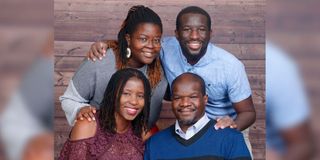
Dr Isaac Opole (seated, right), his wife, Dr Rebecca Opole (seated, left) with their daughter, Odindo-Opole Janet and son, Michael Opole.
“Please don’t call it school captain; I was the ‘head of school’. That’s what we called it,” he explained. “I believe a lot of my social and leadership skills developed during my time there. After that, I attended the National Youth Service in Gilgil, which was mandatory during the Nyayo days. I was in charge of Platoon B, 336 Company, at Sungura Barracks,” Dr Opole recalls.
“In high school, one of the most instrumental teachers for my journey to medical school was Mr Obwol-Ocwet, who taught biology and was from Uganda. Another teacher who greatly influenced me was my physics teacher, Mr Omondi-Mitula. These teachers significantly impacted my education. Physics was one of my best subjects, and I would have pursued nuclear physics if Kenya had any nuclear capabilities. However, my father advised me, ‘My son, find something else.’”
Dr Opole comes from a family of 11. Unfortunately, his father and two of his siblings are no longer with them.
“My mother, Janet Odindo-Opole, 85, continues to inspire me and the rest of our family. My father passed away in 2022 at 92. He worked at Vet Labs in Kabete.”
Dr Opole’s daughter, Odindo Janet Opole, is 29 and works in media and advertising in New York. His son, Michael Otsyula, is 26 and studies economics at the University of Kansas. In his free time, Dr Opole enjoys gardening and watching the Kansas City Chiefs (an American Football team). He also plays the trumpet and the saxophone and is a fan of jazz music.

